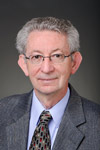Ward looks to “self-help” in tough budget times

Ward
Although the University of Wisconsin–Madison faces stiff budgetary challenges, Interim Chancellor David Ward told the Faculty Senate Monday that there are avenues of “self-help” available to lighten their impact.
In the annual State of the University address, Ward said he sees new approaches to philanthropy, more need-based aid for students, and creative budget reallocations as keys to building on the university’s excellence.
Ward likened the state of higher education funding at public research institutions to a pendulum, which in past years swung between good years and bad years. Today, he said, it is difficult to imagine the return of the good years.
“My fear — and I’m not a prophet — is that the pendulum has fallen off its pin and is lying on the ground,” said Ward. “It’s incumbent on us to figure out strategies to cope with that fact.”
The good news is that those strategies are available, but require new ways of looking at the institution, its work and its funding.
For example, Ward said it might take additional ways of approaching philanthropy that will help to address critical gaps in the university’s base budget. UW–Madison needs at-large gifts to meet institution-wide initiatives as well as very tailored gifts to specific programs, he said.
“It will require us to address these needs internally first and then to leverage our self help into gifts,” he said. “Philanthropy will need assist us in promoting change.”
Wards also said that more need-based financial aid for students, probably with a major donor commitment would continue to be a priority, he said.
“Tuition will need to be pushed in a way that addresses specific educational improvements and these efforts should not embarrass us, because we all come from a tradition that wants to keep tuition as affordable as possible,” Ward said.
The interim chancellor also stressed the importance of administrative savings and stewardship of resources. He pointed to the importance of the Administrative Excellence initiative, an ongoing consultant’s study guided by university input to identify better ways for the university to manage its services.
The project is looking at ways to save money in business services, information technology, auxiliary operations, research administration and other areas.
“What I will insist on is that all savings go into a pot which will be strategically directed to some sort of innovation that is strategically valued by schools and colleges,” Ward said.
In the classroom and in departments across the campus, Ward hopes to see educational innovation. He said the university also needs to engage in a dialog about comprehensiveness and whether “our silos are, in fact, too small and too tall and whether we may need more bridges between them.”
“We’re a comprehensive research university, but we need to decide how comprehensive we want to be,” he asked. “But there are important aspects of comprehensiveness that we don’t want to lose.”
Ward emphasized the importance of base-budget reallocations to maintain quality across the university. “Almost everything new we have done was with new money. We rarely scale our reallocations to support major change so an increased dependence on reallocation will be a skill we will need to nurture,” he said.
On another topic, the University Committee of the Faculty Senate and most other governance groups as well as many constituent groups of the University submitted letters to UW System President Kevin Reilly asking that Ward’s tenure as interim chancellor be extended to two years, delaying the start of a search for a permanent chancellor until fall 2012.
Following the speech, Ward said: “If two years makes more sense than one to other people, that’s OK with me.”
In other action, University of Wisconsin–Madison employees would be barred from carrying concealed weapons while in the course or scope of their employment, under a policy approved Monday by the Faculty Senate.
The policy, similar to a UW System policy now being drafted, states: “No employee shall carry or go armed with a firearm or other weapon at any time while in the course and scope of employment unless it is necessary as determined or approved by the chancellor or designees, usually the police chief.”
The policy does not apply to those employed as law enforcement officers.
Those violating the provision would be subject to employee discipline or dismissal. The policy is also expected to go before the Academic Staff Assembly, officials said.
A new law allowing concealed carry in Wisconsin takes effect on Nov. 1. In addition, the law provides the university may continue to ban concealed weapons in its buildings, athletic events, at campus events and where appropriate signage has been posted.
On Sept. 19, Physical Plant staff began installing signs on all building entrances informing individuals that firearms and weapons continue to be prohibited in buildings.




